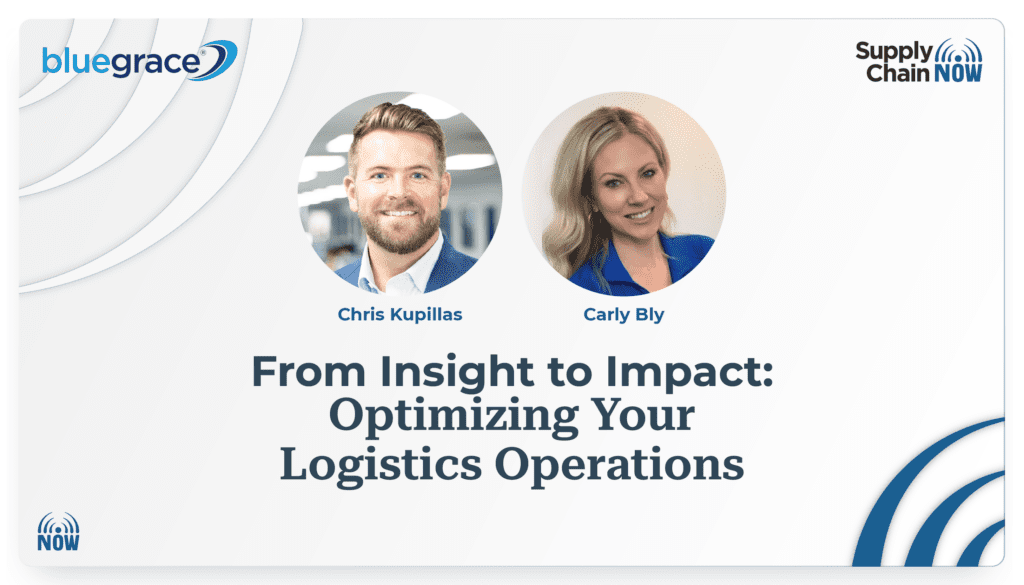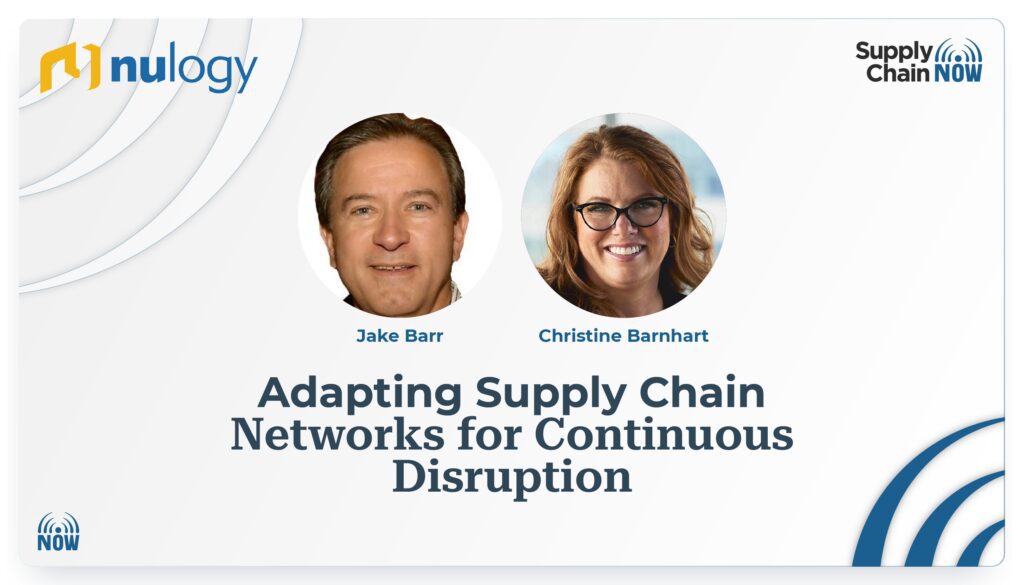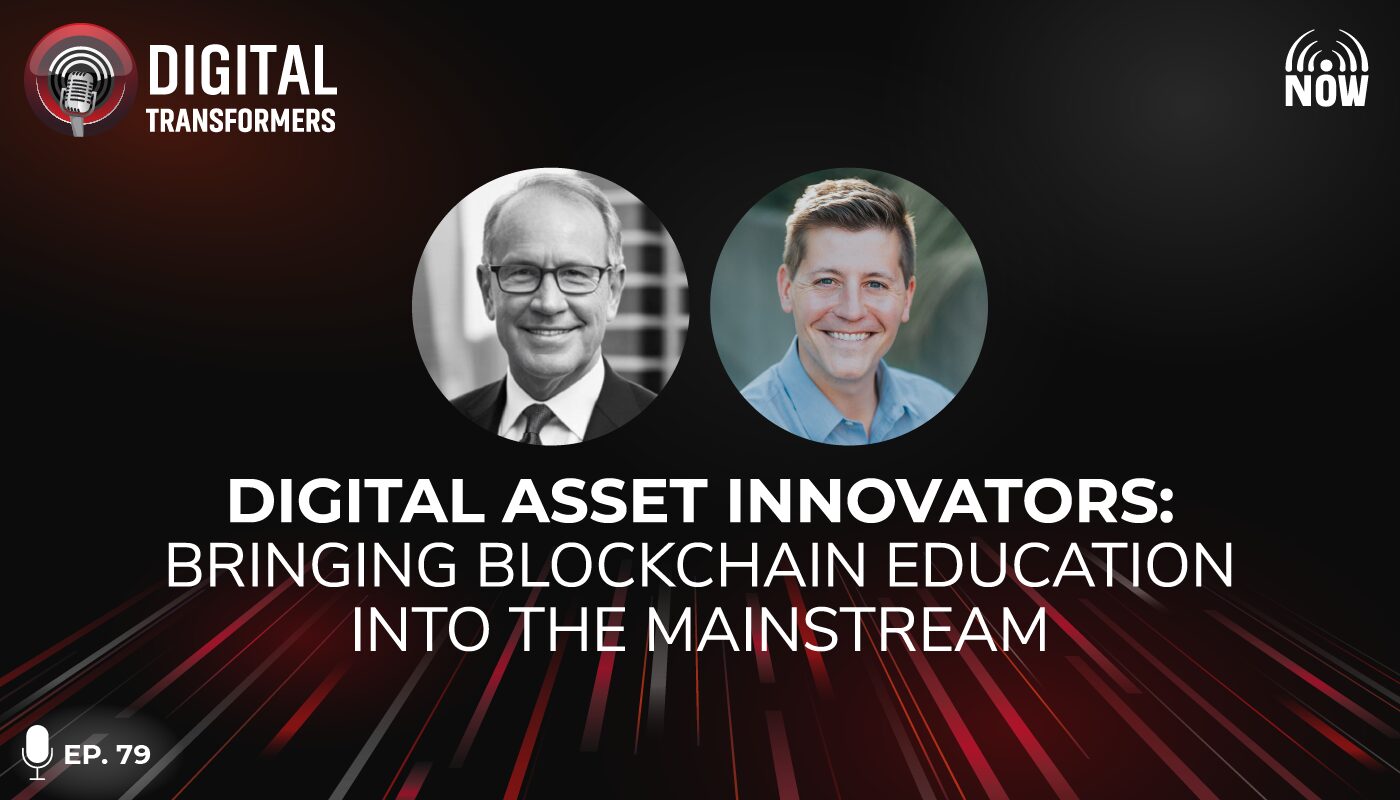Intro/Outro (00:01):
Welcome to Digital Transformers, the show that connects you with what you need to build, manage, and operate your digital supply chain. Join your host in a timely discussion on new and future business models with industry leading executives. The show will reveal global customer expectations, real world deployment challenges, and the value of advanced business technologies, like artificial intelligence, blockchain, and robotic process engineering. And now we bring you Digital Transformers.
Kevin L. Jackson (00:36):
Hello everyone. My name is Kevin L. Jackson. I’m here to present to you the Digital Asset Innovators. This is a series from the National DigiFoundry where we highlight the individuals and organizations that are innovating across the digital asset ecosystem. Today, I am so happy to have with me innovators from the Blockchain Academy. Sir Ryan Williams and Mr. Bryant Nielson. I had to make sure I had said that right. Thank you very much for joining me.
Ryan Williams (01:13):
Thanks for having me.
Bryant Nielson (01:14):
You bet.
Ryan Williams (01:14):
It’s a pleasure to be here.
Kevin L. Jackson (01:15):
So, Ryan, the Blockchain Academy, I mean you are what you say you are, right?
Ryan Williams (01:22):
Yes, quite —
Kevin L. Jackson (01:22):
Tell us a bit about yourself and the blockchain academy.
Ryan Williams (01:26):
Yes, absolutely. I would call myself a workforce professional. I feel, you know, education is a means to getting a job and employment, right? And that’s the space I’ve always been with college and universities mainly. And without the right skills, particularly as we go forward, I very much feel we need to partner to distribute knowledge and information and workforce development. So, that’s what brought me into this space with my partner Bryant Nielson here.
Kevin L. Jackson (01:57):
It’s sort of a unique arrangement. I understand that — I guess, Bryant actually founded the Blockchain Academy. But now you have another organization that you’re leading.
Bryant Nielson (02:09):
Correct. So, I founded the Blockchain Academy due to a client request back in 2015, and we delivered our first training in 2016 — January of 2016. But as we’ve come through this journey, one of the things that we’ve actually come to understand is that having education by itself is not necessarily sufficient. What you end up having to do is you have to have a certification that is a part of the process. It’s the validation of knowledge and an understanding of what is required to perform in something like emerging technologies like blockchain.
Bryant Nielson (02:44):
So, what we’ve done is we’ve created the Web3 Certification Board. And it’s, kind of, forced me to actually step away from the Blockchain Academy simply because the certifications that we’re trying to establish are going to be ISO and ANSI certified — certifications. And as a result of that, I have to have a level of independence.
Bryant Nielson (03:04):
But what the certifications brings to the National DigiFoundry is it brings to it two things. It brings a touchstone to the accomplishments of all the participants in terms of validating their skill sets, not only for their participation in the Dow, but also for their employment outside of the Dow. And it allows for then people to globally, accessibly use these certifications to represent not only what they can do as an organization, but what they can do as individuals.
Kevin L. Jackson (03:38):
Well, you know, when you started the blockchain academy, when anybody hears about this, the first thing that comes to their mind is, like, Bitcoin. And the next thing that come to their mind is it must be a scam. So, how did you survive, or what made people say, yes, I want to do that?
Bryant Nielson (03:59):
You know, that’s been one of the, how do we put it? It’s an urban legend.
Kevin L. Jackson (04:04):
Urban legend.
Bryant Nielson (04:05):
Where there’s a story about what Bitcoin is and what blockchain is. And what we’ve found is that it takes only a little explanation as to understand what the difference is between Bitcoin and blockchain. Bitcoin by itself is just a single application.
Bryant Nielson (04:22):
So, if you went to the Northern California and you went to the forest up there, where the Sequoia trees are there, you can see these massive, massive trees that go 300 feet into the air. And they’re so big around. They’ve lived for probably thousands of years that you could drive a car through some of them, that’s how large they are. But they’re not the whole forest.
Bryant Nielson (04:44):
So, Bitcoin and cryptocurrencies are these magnificent Sequoia trees. And it’s impressive. It is impactful, but it’s not the whole forest. Blockchain is the forest. It is the entire infrastructure. It is using this same analogy. It is the soil, it is the rocks, it is the rainfall, it is the rivers. It’s everything else. But you still can recognize that Bitcoin is part of it.
Bryant Nielson (05:14):
I’ve seen many graphs that give a large circle as to what Bitcoin technology represents. And it’s always funny because they put a little teeny circle right at the bottom, then says that’s crypto. And so, it’s not been a difficult thing, but it does require education.
Kevin L. Jackson (05:32):
No, that’s great. So — but now, Ryan, you’re actually innovating in the education space around Web3 and cryptocurrency and crypto, you know —
Ryan Williams (05:46):
Any of these emerging technologies, you know.
Kevin L. Jackson (05:48):
So, how — yes. What’s the innovation you’re doing here?
Ryan Williams (05:51):
Well, one, every asset, whether it’s IP or a physical asset, will be tokenized over time. And the more we can tokenize and granulize education and skills, that’s the space I’m in but you can talk about coral reefs and trees and real estate, everything will be tokenized. And so, this major sea change from Web2 to Web3, and we’ve been living through the internet, right? But now we get to own the internet.
Ryan Williams (06:16):
And this is something that’s really lost on people as we make this transition. And it’s kind of going back to the individual, right? We’re no longer — our data should come back to us and we have to take control of this.
Ryan Williams (06:28):
So — but the college and universities and higher education, you know, they’ve been doing what they’ve been doing for so long and they — they’re great at research. But when it comes to these emerging technologies and the skills that are needed right now, because we are — we’re innovating a lot faster than previously before.
Ryan Williams (06:41):
We feel it’s our mission to really help schools, you know, launch quickly or, you know, experiments like the Dow to quickly educate everybody that’s part of it. Give them the tools and resources to get started. And then we hope to establish standards in the industry that are widely recognized. And we can all say, all right, this person can actually do this skill. They can code a smart contract and they’re hireable. Because it’s really hard to find talent in this space and workforce in general.
Ryan Williams (07:09):
So, how do you make that better? And we believe it’s the tokenization of skills and applying those skills to individuals and making sure the universities have the means to do that quickly as the sea change comes.
Kevin L. Jackson (07:23):
You know, you set a term there. You want to own your piece of the internet. Sort of, akin to owning some land. So, this is sort of, like, homesteading the internet and claiming your own data and having the skills to manage that. That’s a really innovative way of thinking about it.
Ryan Williams (7:48):
Yes.
Kevin L. Jackson (7:49):
So, what got you interested in the National DigiFoundry?
Ryan Williams (07:53):
Well, you guys are actually doing it, right? A lot of this space, in the crypto space, it is a lot of great ideas. People raising money and maybe sometimes it’s too much about the raising of the money and not the actual application and building of it. But again, there’s not enough talent to do that. That’s about largely been the choke point for our growth.
Ryan Williams (8:13):
And I love what the DigiFoundry is doing is because you’re actually applying the technology from jump. It’s not, hey, we’re going to do this and get a bunch of people together. You’re building it and then people are making it better as a community.
Ryan Williams (8:27):
And so, we’re really excited to be a part of that. And, you know, the first step is using tokens to gain access to education. But eventually we want to tokenize and gamify education in general because our attention spans are getting shorter. We need, you know, those dopamine hits. So, if you make it part of, you know, an achievement that’s tokenized, I really think that’s the — we’re on our first step to that journey with NDF.
Kevin L. Jackson (08:52):
Oh, wow. That’s amazing. But Bryant, this is not a local thing, right? And you’re actually part of an international drive to really professionalize Web3?
Bryant Nielson (09:05):
Right. So, certifications by themselves generally are issued by the local institutions. So, in previous version of the Blockchain Academy, we thought that we could just issue the certifications ourselves. The problem with that is then there’s no value to the certification because there’s no standard that’s set.
Bryant Nielson (9:23):
So, you could create an academy and then say, my two hour course makes you a blockchain developer. You can come to the blockchain academy and take 25 hours worth of coursework and have to do another 20 hours worth of project work to get that same certification.
Bryant Nielson (9:40):
So, there was really no standard that was being set.
Kevin L. Jackson (9:42):
No equivalence.
Bryant Nielson (9:43):
Or equivalence. Som, part of what we knew is we actually had to raise that. We actually had to go out and find ISO. I actually — it has a standard that’s called 17024, and it is the standard for personal understanding and knowledge.
Bryant Nielson (09:58):
And so, all of the certifications that we are creating are adhering to this new standard, this international standard. And ISO doesn’t issue accreditation to certifications directly. They do it through every country group, and in the United States it’s ANSI. So, ANSI is the approved accreditor for certifications.
Bryant Nielson (10:20):
So, we’re working with the ANSI people in Washington, D.C. —
Ryan Williams (10:23):
And ANSI is what?
Bryant Nielson (10:24):
ANSI is the American National Standards Institute. We’re working with them in Washington D.C. to make sure that all of the certifications that we have not only meet what’s referred to as a job task analysis. But once we have a job task analysis associated with the certification, we then work through what’s called a blueprint. Once we’ve been built the blueprint, which is that the knowledge base that a person has to have for that specific certification, then we have to go and create the assessment.
Bryant Nielson (10:54):
But the assessment is just not just a couple of people creating these questions. They act — each question has to go through a bias analysis through a psychometrician. A psychometrician is a professional who goes through and makes sure that there’s — a question is asked in such a way, and the answers are answered in such a way that there is no bias based on race or gender or even, you know, generational functions.
Bryant Nielson (11:21):
So, I’m obviously not a Gen Z person, but it would happen.
Kevin L. Jackson (11:25):
I couldn’t tell.
Bryant Nielson (11:27):
I know, it’s deceiving. But that’s what we’re trying to do. And that’s the effort that we’re going through simply because then all of these standards, because we are adhering to the ISO standard, they’ll be accepted by governments around the world, therefore by corporations.
Kevin L. Jackson (11:43):
You know, this is really amazing. One thing that kind of gave me a chuckle is that you are actually using NFTs for this. I mean, you know, but the big craze was about buying and selling NFTs and investing in NFTs. But, Ryan, you’re using NFTs to indicate the certifications? And the name, that really gets me.
Ryan Williams (12:10):
Yes. So, there’s a big difference to the NFTs we’re focused on, and the — and still the industry is getting there, and it has to do with identity. So, they’re either called identity tokens or soul bound tokens. Meaning it’s an NFT that, you know, it is typically an image or something that — along those lines. And it’s a record that you receive, and once you achieve it, once it comes to you — and this could be same for vital records, birth, marriage, death certificates, it’s all tied to the individual. So, that cannot be transferred. It has no monetary value outside of what it means to the individual, right?
Ryan Williams (12:44):
And so, we believe that sole bound tokens are going to be more important. Your health records will eventually be identity tokens. It will all be tied to the individual. Again, this is coming back to the data and you owning your own data.
Ryan Williams (12:57):
So, we feel, you know, when you graduate from a great institution like University of Texas, San Antonio, you get a degree, but a lot of times you’re like, oh, I need my transcript. Why don’t you have your transcript? You got to go back to the Burser’s [phonetic] office. They’re like, well, it’s $50. And — so like — but I paid — I already paid $50,000, right?
Kevin L. Jackson (13:14):
Yes, yes.
Ryan Williams (13:15):
So, the point is once you achieve something or once it’s really your data, it should be tied to you as the individual, and you should have control over it, right?
Kevin L. Jackson (13:23):
You know, when you think about it, this is the ultimate when it comes to a digital asset. I mean, it’s your soul.
Ryan Williams (13:33):
Right.
Kevin L. Jackson (13:33):
So, I really love the way you guys are approaching this and the innovations are going to be, I mean, awesome. So, thank you very much for joining me here to talk about the innovations that you’re doing and creating the ultimate digital asset. And thank you very much for joining us in Digital Asset Innovators. Please visit the National DigiFoundry, digifoundry.org. Thank you.
Intro/Outro (14:06):
Thank you for supporting Digital Transformers and for being a part of our global Supply Chain Now community. Please check out all of our programming at supplychainnow.com. Make sure you subscribe to Digital Transformers anywhere you listen to or view the show. And follow us on Facebook, LinkedIn, Twitter, and Instagram. See you next time on Digital Transformers.



